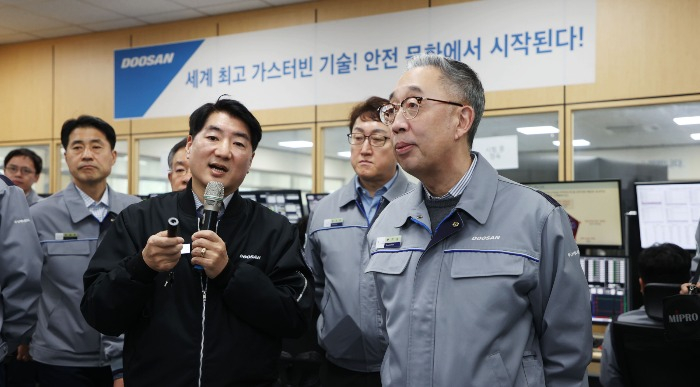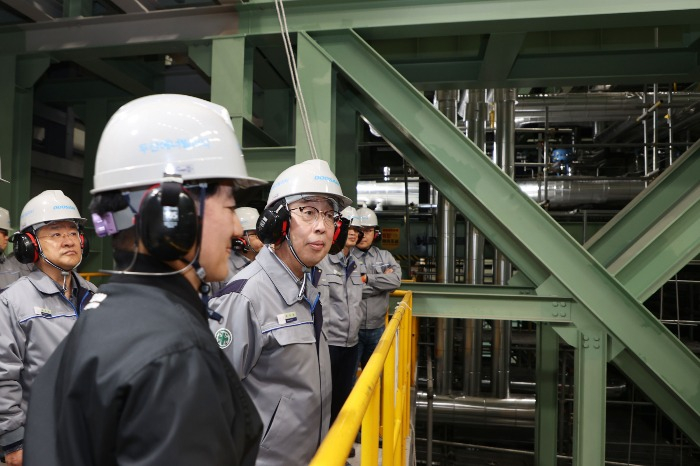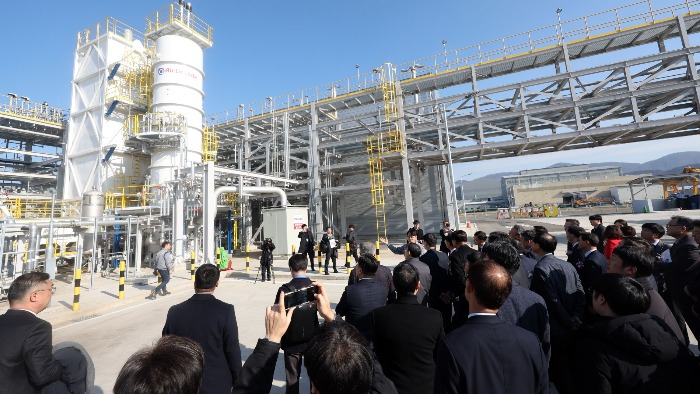Doosan gears up to develop world's 1st hydrogen gas turbine
Doosan Enerbility aims to develop a hydrogen-fueled gas turbine by 2027, three years ahead of GE and Siemens
By Mar 07, 2024 (Gmt+09:00)
LG Chem to sell water filter business to Glenwood PE for $692 million


Kyobo Life poised to buy Japan’s SBI Group-owned savings bank


KT&G eyes overseas M&A after rejecting activist fund's offer


StockX in merger talks with Naver’s online reseller Kream


Mirae Asset to be named Korea Post’s core real estate fund operator



In September 2019, Doosan Enerbility Co. wrote a new chapter in its history. It became the world's fifth company to develop a gas turbine even at the peak of its liquidity crunch.
"The project which we were unsure to be successful finally came to fruition," Park Geewon, chairman and chief executive of Doosan Enerbility said in a note posted on his social networking service that day.
In 2013, the South Korean power plant builder threw down the gauntlet to muscle into the gas turbine market controlled by General Electric, Mitsubishi Power and Siemens, after it failed to acquire Italy's Ansaldo, a gas turbine developer.
It has spent 6 trillion won ($4.5 billion) on the development for six years. The government injected an additional 60 billion won in what it selected as a national project.
It bagged a 280 billion won ($210 million) supply order for gas turbines each in 2023 and early this year.
Over the next five years through 2028, it aims to win more than 7 trillion won ($5.3 billion) worth of gas turbine orders.
“This year will be the first year for our gas turbine business to take off," Park said during his on-site visit to the company’s hydrogen gas turbine production lines in Changwon, South Gyeongsang Province on Thursday.
To advance into the gas turbine market, it has successfully produced super heat-resistant alloy material that can withstand high temperatures of over 1,500 degrees Celsius, the most challenging technology for the development of a gas turbine.

HYDROGEN-FUELED GAS TURBINE
It is now taking another leap forward to produce a second-generation gas turbine, or hydrogen-powered gas turbine, to grab the lead in the market.
By next year, it aims to complete the development of gas turbines running on hydrogen and gas with a mixture ratio of 50:50.
It is also working to develop turbines purely run on hydrogen for power generation by 2027, three years earlier than GE and Siemens's timetables to produce them.
If it goes to plan, Doosan will likely be the world’s first developer of a hydrogen-powered gas turbine.
Doosan Enerbility is also developing the world's first 400-megawatt (MW) ultra-large hydrogen-fueled turbine and aims to unveil it by 2027. Korea East-West Power Co. will test-run it.
A gas turbine is a combustion engine at the heart of a power plant that converts natural gas into electricity. It is largely comprised of a compressor, combustor, and turbine.
Natural gas and compressed air are injected into the gas turbine at the same time to combust. The generator runs on the high-temperature and high-pressure exhaust gas produced from the combustion.
Coal-fired and nuclear power stations instead use steam turbines to run power generators.

The price of one gas turbine is as high as that of 380 cars in total, according to Doosan Enerbility. One wing of a turbine sells for about 30 million won.
Some 150 units of gas turbines installed at LNG plants in South Korea are all imported.
“Considering the domestic power plant construction plans through 2030, homegrown gas turbines could replace about 10 trillion won worth of turbine imports,” said a Doosan Enerbility official.
The global hydrogen gas turbine market is forecast to reach 40 trillion won by 2030, according to Japan's Yano Research Institute.
Write to Woo-Sub Kim at duter@hankyung.com
Yeonhee Kim edited this article.
-

-
 EnergyDoosan Enerbility secures contract for cask design from KHNP
EnergyDoosan Enerbility secures contract for cask design from KHNPNov 02, 2023 (Gmt+09:00)
1 Min read -
 Aerospace & DefenseDoosan Enerbility to produce aviation gas turbine with ADD
Aerospace & DefenseDoosan Enerbility to produce aviation gas turbine with ADDAug 21, 2023 (Gmt+09:00)
1 Min read -
 EnergyKorea's Doosan Enerbility sells Bobcat stake in $214 mn block deal
EnergyKorea's Doosan Enerbility sells Bobcat stake in $214 mn block dealJun 21, 2023 (Gmt+09:00)
1 Min read -
 ConstructionDoosan Enerbility wins back-to-back power plant deals in Central Asia
ConstructionDoosan Enerbility wins back-to-back power plant deals in Central AsiaMar 22, 2023 (Gmt+09:00)
1 Min read -
 Business & PoliticsDoosan Enerbility to introduce ammonia co-fired power plant in Vietnam
Business & PoliticsDoosan Enerbility to introduce ammonia co-fired power plant in VietnamDec 23, 2022 (Gmt+09:00)
1 Min read -
 ConstructionDoosan Enerbility signs $1.2 billion deal to build nuclear plant in Egypt
ConstructionDoosan Enerbility signs $1.2 billion deal to build nuclear plant in EgyptNov 10, 2022 (Gmt+09:00)
1 Min read


